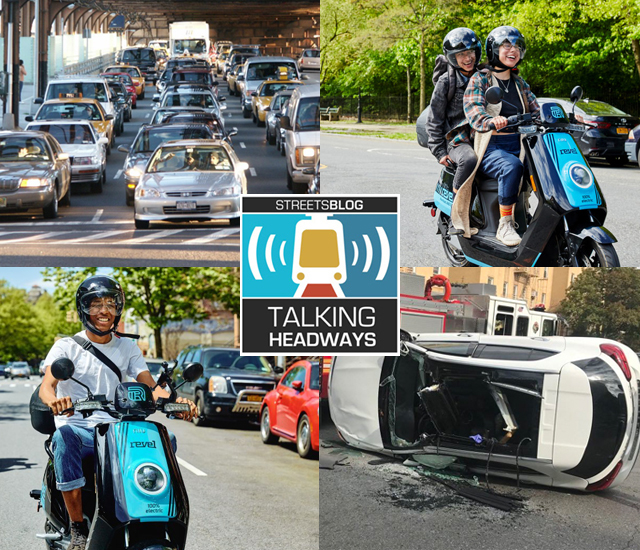This week, we’re joined by Haley Rubinson, vice president of Business Development at Revel. We talk about why mopeds work for urban mobility, the dominance of automobiles in discussions about transportation, safety issues, and if land use plays a part in adoption trends.
If you prefer to read, a partial transcript is below the player. If you want the full transcript (which may have some typos), click here.
Jeff Wood: Mopeds are kind of in this space between automobiles and micro-mobility. From a regulatory standpoint, do you feel like you’re getting the best of both worlds or you do feel like you get the worst of both worlds?
Haley Rubinson: I always say the best of both worlds. We’re not a first/last mile exclusively. There’s definitely a value in that. So I think we fit into the space nicely, but in the cities that we are in, if you’re really going to leave your car at home (or you’re really going to opt for a more sustainable mode, maybe not buy a car at all), people kind of need the full-range option. And you probably don’t want to take a kick scooter four miles. So I think we fit nicely. If you’re talking about in more of a regulatory perspective, we’re also very clearly defined in city and state statutes.
We’re also very easy to enforce against because we have license plates. So they’re actually in our conversations with law enforcements and all of the cities that we operate, it’s actually a lot easier for them to deal with a fleet of mopeds that park and ride in the streets, just like cars do. There’s a level of accountability. It’s also highly regulated. We have to get license plates for registrations, insurance for every single one of our vehicles. In addition to that, everyone who rides our vehicles is covered by insurance. So that is a fundamental difference between us and, you know, your fixed scooter or e-bike company, the ride itself is covered by insurance.
And so I think it works more seamlessly and transportation networks as they exist today with existing infrastructure, the way what people are used to today than these other modes. That's not to say we shouldn’t be building out our cities to accommodate other modes, but I do think they have been fitting a little more seamlessly in the cities that we’re in.
Jeff Wood: If there was one thing you would change though, what would it be from that standpoint of the regulations or even from like infrastructure or things that you would want say like the city of New York to do to make it more hospitable for mopeds?
Haley Rubinson: I have to say the city is pretty hospitable to mopeds. I think it’s interesting, actually, working with the city, having come from where I was, 10 years ago, working at New York City DOT. Back then, if you took away a parking space for, you know, a bike kiosk, it was just like bloody murder. And it’s really not like that anymore. I think there’s a broader acceptance in respect to mopeds because we don’t require special infrastructure. I would like to see ways to make the city more hospitable to other modes that are not 4,000-plus-pound motorized gas-guzzling vehicles and trucks, and start replacing them with these lower footprint type vehicles of all types.
But as it stands, I would say the regulatory framework, the regulatory structure here, the streetscape is hospitable. It works for our business model even more so I would say than for other cities.
Jeff Wood: I feel like a lot of city officials have a blind spot for cars. They let them get away with more, they look the other way when it comes to safety, collisions, etc. We’ve seen that in New York and in other cities as well — they kind of give them a little bit more leeway. Do you feel like cars kind of get too much leeway? I just feel like there is a blame-the-victim mentality when it comes to crashes involving Revel.
Haley Rubinson: I agree. You know, as a company that is providing a transportation service, we have responsibility — we are accountable to provide, you know, a clean and efficient, safe service, which we do, but, yeah, there’s human nature. Right? And so the one difference from what you’re saying that I would say is that it’s less about the regulators and more about the general public perception. We’ve all just accepted that you need cars, which I’m not even necessarily disagreeing with, but we’ve all accepted the dominance of the motor vehicle as we think of it. And that at this point it is what it is.
And we’re just all going to accept it. And it’s an inherent risk, you know, and we do have Vision Zero and we have a lot of stuff that regulators and advocates are doing to improve safety. But I think it’s really the general public who, you know, may not be paying as much attention. These new modes seem scary, but people at places like the Department of Transportation, and within advocacy organizations, are much more sensitive to what’s happening on the streets on a daily basis. So that’s not always the case. [Refers to Revel's problems in New York City over the summer, as Streetsblog NYC covered.]
It was the case, the DOT acknowledges for sure, that we need to get Vision Zero and they’re leading the way. And so I think concerns are understandable in the press. Some of the other things that you read, I think are a perception issue, but again, not taking accountability away from us as a company, but yeah, I think cars are the problem for sure, but we all have to do our part.






